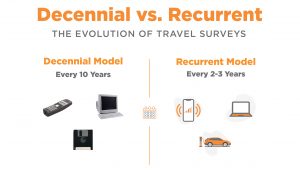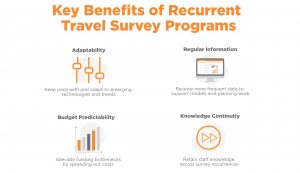Household travel surveys (HTS), which are typically conducted every 10 years, have been an important instrument in the toolkit of state and regional transportation planners for decades. Decennial HTS deliver valuable, real-world data for travel demand models, trend analyses, and forecasting.
However, change now happens at break-neck speeds—whether it’s advancements in mobility technologies or shifting travel and commuting patterns. The decennial model of conducting surveys every 10 years has struggled to stay ahead of these changes, especially in the aftermath of the pandemic when remote/hybrid work arrangements have precipitated additional changes in behaviors.
Recurrent travel surveys were first deployed to address the core deficiencies associated with decennial surveys. Having been conducted in the United States in some form for at least a decade now, recurrent survey programs have demonstrated their utility and practicality to agencies looking for faster, more flexible solutions for real-world data collection.
What Is a Recurrent Travel Survey Program?
A recurrent travel survey program is a systematic approach to transportation planning in which travel surveys are conducted on a more frequent and regular basis. Rather than conducting such surveys every 10 years, recurrent programs allow agencies to continuously gather and analyze data on travel behaviors, enabling them to adapt to the dynamic landscape of transportation trends and technologies.

Evolving from the Decennial to the Recurrent: How Travel Surveys are Adapting to the Fast Pace of Technological Change
5 Reasons to Adopt a Recurrent Travel Survey Program
Several agencies in the United States have reassessed the frequency of their household travel behavior data collection programs. Through this process of reflection and analysis, many have concluded that recurrent travel survey programs offer greater benefits when compared to decennial surveys.
Based on RSG’s experience developing and deploying these programs with our client partners across several states and regions, here are five important reasons we’ve observed as to why agencies switch to recurrent travel survey programs:
1. Adapt to Rapidly Changing Travel Behaviors
Whereas decennial surveys occur every 10 years, recurrent programs are much more frequent—every two to three years, in most cases. Not only does this enable incremental improvements with each survey, but it also means transportation agencies have data on a smaller time scale, allowing them to see how patterns change in the short term. This information is essential today, especially with emerging technologies like ride-hailing, micromobility, and vehicle electrification.
2. Gain Regular, Frequent Information
In addition to, and as a consequence of, gathering data on a shorter time scale, recurrent programs provide a much higher speed and frequency of information. Given present demands for information, and the fact that many big data sources aim to provide up-to-the-minute information on a region, recurrent travel survey programs deliver more timely insights compared to decennial surveys.
3. Enhance Flexibility in Data Collection and Analysis
Recurrent programs have inherent agility. Let’s say a region conducted a survey two years ago, before a major development project that redirected traffic away from a central business district. Instead of waiting another eight years to acquire new data—no doubt, after even more changes in transportation systems and technologies—a recurrent program could provide the flexibility to gather data just before and after implementation. And if new technologies emerge, you can start collecting data on them much faster to understand how they may impact the system.
4. Gain Budget Predictability with Smoother Funding
While a 10-year timespan between surveys kicks the budgetary can down the road, it becomes a significant investment each time, especially when a regional or statewide model requires extensive updates. Instead, recurrent programs allow surveys to become a more regular and smaller portion of the budget every few years, distributing the costs over time and easing cash flow concerns at budget-conscious agencies. Not only does this facilitate a smoother funding process, but it also makes projects more feasible by making financial planning predictable and less burdensome.
5. Maintain Continuity and Knowledge Retention
Finally, one of the key advantages of using a recurrent model is the ability to maintain continuity and enhance knowledge retention within an agency. Frequent surveys ensure that the expertise and understanding of travel patterns, models, and analysis methods follow through each survey project, updating with the latest information and best practices each time. Developing this consistent knowledge base among staff is crucial, especially in transportation planning, where historical data and trend analysis play a significant role in planning and decision-making.

Exploring the Impact of Recurrent Travel Survey Programs on Data-Driven Decision Making
Proven Recurrent Travel Survey Program Strategies
Our extensive experience helping transportation agencies develop and implement recurrent travel survey programs informs our perspective on the value these programs offer. To understand just how effective these strategies are in providing timely data on a cost-effective schedule, here are three agencies we’ve worked with who have made the switch to a recurrent travel survey program:
Metropolitan Council’s Travel Behavior Inventory (TBI): The Twin Cities’ shift to a biennial survey schedule in 2018 has enabled them to identify, understand, and respond to changes in regional travel behavior more quickly. Their survey occurs every other year and samples approximately 7,500 households to participate. Every five years, they also conduct a transit on-board survey, which helps them obtain more accurate data about transit use in their region.
Puget Sound Regional Council’s (PSRC’s) Sound Regional Travel Study: PSRC’s recurrent household travel survey program “collects day-to-day information from households in Washington State’s central Puget Sound region.” PSRC completed its first six-year phase with three waves in 2017, 2019, and 2021. This work demonstrated the recurrent survey’s ability to quickly and cost-effectively help the agency undertake data collection, monitoring, and modeling activities. PSRC completed survey implementation in 2023 with the expectation that data will show the travel trends stabilizing after the pandemic. The 2023 survey will be used to estimate their ActivitySim-based travel demand model. Further waves are planned for 2025, 2027, and 2029.
North Carolina State University’s (NCSU’s) Triangle Travel Survey: The Triangle Region began its recurrent household travel survey program in 2016 to collect more current information. Managed through a partnership with NCSU, this survey project highlights the benefits of professional collaboration, improving data utility for both regional planning and broader research purposes.
How Can Agencies Better Position Themselves for a Recurrent Travel Survey Program?
Agencies thinking about making the switch to a recurrent household travel survey program should consider the following:
Secure Buy-In from Internal Stakeholders: Gaining internal support will be crucial. Supporters of recurrent travel survey programs should advocate the benefits of these programs and emphasize their role in providing timely, relevant data on a consistent schedule.
Coordinate with Partner Agencies: Building strong partnerships early on will enable more effective resource pooling, spreading out the responsibilities across agencies.
Plan and Budget for Shorter Survey Cycles: Transitioning to a recurrent approach will also require agencies to adapt their budgets to accommodate more frequent surveys.
Leverage Expertise for Data Collection and Model Analysis: Seeking expertise from outside the agency can bring a fresh perspective while filling skill gaps with specialized knowledge.
Support a Recurrent Travel Survey Program
Making the switch to a recurrent travel survey program is a beneficial decision for agencies looking to continue collecting superior data on household travel patterns amid a changing transportation landscape.
At RSG, we specialize in delivering the solutions, tools, and expertise to make this transition as seamless and effective as possible. We’re uniquely suited to the task, with extensive experience and knowledge in data collection, modeling, and analysis. We’ve also helped more agencies shift to recurrent travel survey programs than any other firm, including programs that leverage multiday data collection using rMove™.
If you’re looking for a trusted partner to help you design your next recurrent travel survey program, contact our team for more information.



